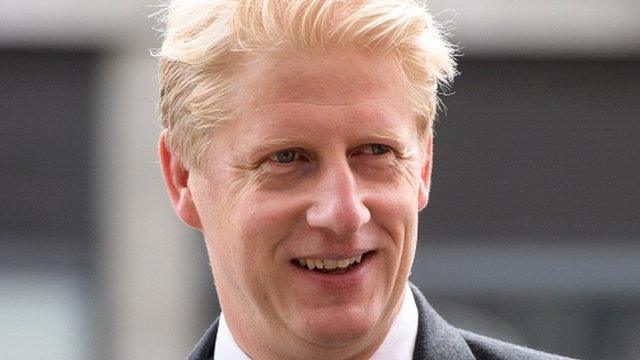Students to have value-for-money contracts with universities
- Published

Students will be given contracts to protect their consumer rights and "value for money" from university
Students will have formal contracts with universities, so they can challenge them over too few teaching hours or if facilities are inadequate, says Universities Minister Jo Johnson.
Mr Johnson highlighted growing concerns among students about not getting good value for money.
He also warned universities to stop "excessive" pay for vice-chancellors.
But Mr Johnson rejected calls to scrap tuition fees - saying it would be a "disaster of historic proportions".
The Russell Group of leading universities was lukewarm in its response to the idea of a binding contract - warning of "unintended consequences" and saying that "no one would want to see standards undermined by the risk of legal action".
Labour said that talk about value for money for students was a "smokescreen" to cover for the unpopularity of the rising cost of fees.
In a speech to the Reform think tank in London, Mr Johnson fought back against calls to stop the rise in tuition fees and interest rates on loans.
The Institute for Fiscal Studies has warned that higher fees of £9,250 and interest rates rising to 6.1% will mean graduates leaving university with debts of more than £50,000 on average.
Former Education Minister Lord Adonis has called such high levels of fees and interest charges "indefensible", and the head of the Russell Group of universities has called for a reassessment of interest rates.

Jo Johnson says vice-chancellors will have to explain their high levels of pay
But Mr Johnson, while saying such charges would be kept "under review", he defended the principles underlying the current system as progressive and providing the funding for extra university places.
Mr Johnson said it was "outrageous" and "entirely false" to suggest that higher tuition fees had deterred disadvantaged students from going to university - and that entry rates for young people from poorer backgrounds were at record levels.
Labour's policy of scrapping tuition fees would mean universities depending on government funding, said Mr Johnson, and he said that if higher education was competing against other pressures on public spending, universities would see their budgets squeezed.
It would mean a "long decline into mediocrity", said Mr Johnson, and a falling number of places.
He said the cost of scrapping fees, clearing existing student-loan debts and repaying students who had already paid off their loans would require a 2.5p hike in the basic rate of income tax.
But he also called for the university system to become much more responsive to the needs of students.
Mr Johnson said the newly established Office for Students would consider how to introduce contracts for all students, giving them a way of contesting the quality of their courses.
This would cover areas such as contact time, resources and assessments.
"Although contracts do exist in various forms in some institutions, most of them do not provide enough detail to be useful," said Mr Johnson.
"Providing students with greater contractual certainty", said Mr Johnson, would "help to address much of the dissatisfaction over seeming poor value-for-money of undergraduate education".
Mr Johnson said such contracts would tackle problems of "non-delivery" for students and would give them "some form of redress", which could include "legal remedies".
The minister also told universities to restrain pay for vice-chancellors - with dozens of university heads now receiving over £300,000 and some being paid more than £400,000.
"When students and taxpayers invest so heavily in our higher education system, value for money should be guaranteed. Yet, I am still hearing students say that their course is poor quality.
"This is not good enough, especially when some vice-chancellors take home a wage that in some cases exceeds that of the prime minister."
But Labour's universities spokesman, Gordon Marsden, said Mr Johnson was "completely toothless" over vice-chancellors' pay and his complaints would be "kicked into the long grass".
"His announcements today are a smokescreen to dodge mounting evidence that the cost of loans is pushing students away from applying to university and forcing more to drop out," said Mr Marsden.
- Published7 June 2017

- Published8 July 2017
- Published13 July 2017